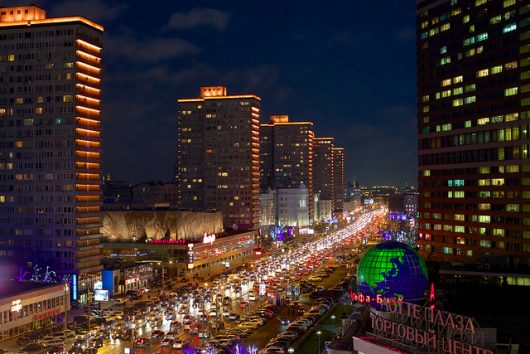Top 10 Facts About Human Rights in Russia

Russia has become a regular fixture in much of today’s news. From the 2016 U.S. election and subsequent investigations to international relations and finally the most recent, FIFA 2018 world cup.
Russia has been ubiquitous in the Western world’s thoughts and discussions. With an increase in international scrutiny, Russia has been placed under a long-needed microscope, displaying an unfortunate state of corruption, violence and human rights violations.
10 Facts About Human Rights in Russia
-
- Russia is currently experiencing its worst human rights crisis since the Soviet era. Under the guise of national security, Russia has entered an age of control and restraint on citizens’ basic human rights. In the past two years alone, numerous laws and policies have been enacted, restricting citizens’ rights to freedom of religion, assembly, free speech and other formerly protected human rights.
-
- Conditions may worsen for those in Russia due to other countries’ policy changes. The UK recently determined that upon leaving the EU, they would also leave behind the EU Charter of Fundamental Rights and European Court of Human Rights. Should this occur, it would lend credibility to other countries interested in removing themselves. Although Russian State Duma Vice Speaker, Pyotr Tolstoy, stated earlier this year in March that there are no plans to withdraw from the ECHR, prior to his statement, multiple news outlets had reported that the Russian authorities were, in fact, discussing that possibility.
-
- Russia has created an environment of legalized human rights violations that go beyond simply enacting unfair laws. Since law enforcement and the judiciary system are essentially under the control of President Vladimir Putin, every step of the legal system is fraught with human rights violations and deep-rooted corruption.
-
- So long as the world continues to say nothing, the Russian government will maintain its control through the attack on human rights and freedoms, relying on violence and misinformation to manipulate not only Russians’ views of their country but the western world’s as well. While the world ignores the current situation in Russia, the human rights violations have worsened and become more normalized. By speaking out against the abuses, the U.S. and others can begin the long-needed open dialogue to address the issues.
-
- These human rights violations do not just exist within the country. Since reclaiming the territory of Crimea in 2014, Russia has exercised their control in a region that had been independent for nearly 60 years. Throughout the time Russia occupied Crimea, the UN has reported numerous human rights violations. This includes the imposition of Russian citizenship as well as torture used to control residents and the potential threat they would pose by exercising their right to protest. Some of the human rights violations are listed below.
-
- Freedom of Assembly: An increase in human rights violations has resulted in an increase in protests across Russia. The ECHR ruled in Lashmankin and Others v. Russia that the right to assembly was being violated, yet restrictions and violations continue to persist or worsen. Protesters are often young people and their activism has the potential to negatively affect their future. While the majority of these protests are peaceful, Russian police have arrested thousands of protesters, bystanders and journalists, often using excessive force and subjecting many to arbitrary detention and unfair trials. Once identified, Russian authorities continue to be a forceful presence in the lives of protesters.
-
- Freedom of Association: Since the enactment of the ‘Foreign Agents’ Law in 2012, Russian citizens’ right to freedom of association has been under attack. This law requires independent groups that receive any foreign funding and engage in any sort of political activity to register as ‘foreign agents’—a term which essentially translates to ‘traitor’. The majority of these groups are associated with human rights work or environmental, health or social issues, and many have shut down due to heavy fines or simply the negative label of ‘foreign agent’. To date, 76 nonprofits attempting to contribute to the wellbeing of citizens are on the list of active ‘foreign agents’.
-
- Freedom of Expression: In an era of fake news, media control and online communication, the freedom of expression is a vital right for all. In July 2016, President Vladimir Putin signed the Yarovaya Law, which requires internet and cellular providers to retain personal data for up to three years for use by security services, as a means of stemming terrorism and extremism. In the first two months of 2017, 94 Russian citizens were imprisoned for extremist speeches on online platforms, associated mostly with criticism of the Russian occupation of Crimea.
-
- Women’s Rights: In February 2017, a law decriminalizing domestic violence by a close relative that does not lead to hospitalization or loss of ability to work was passed. By allowing domestic violence to persist in any form it becomes normalized and often escalates within a household. The mayor of Moscow denied activists the right to protest this law, despite its grave effects on the safety of women.
- Freedom of Religion: Many religious minority groups are harassed, subjected to banning or blocking of their websites. Under the Yarovaya Law of 2016, these groups will also be fined for practicing or promoting their religion outside pre-designated places. In April 2017, the Russian Supreme Court banned the Jehovah’s Witnesses organization calling it extremist, thereby restricting the freedom of the religion’s 170,000 worshippers across the country. Those who continue to practice this religion may face up to 12 years in prison.
Through these facts about human rights in Russia, one can see the deep-rooted history of corruption and injustice which has penetrated some of the most basic human rights even in the 21st century. However, the potential for change exists, as many Russian citizens continue to protest unjust laws and the world begins to focus on addressing human rights violations in Russia and beyond.
– Anna Lally
Photo: Flickr
